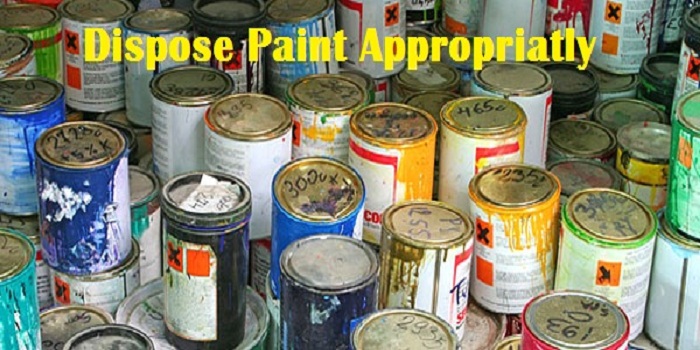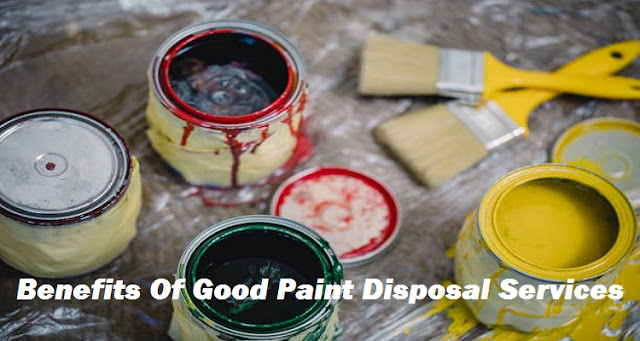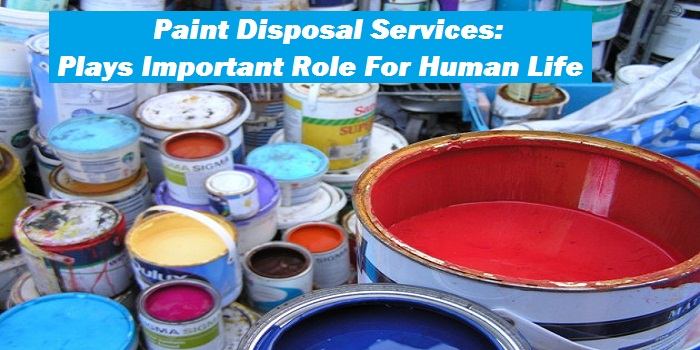How To Appropriately Dispose Of Paint And Effects For Not Doing It Correctly
The use of serious metals in
paint has raised concerns due to their toxicity at high levels of exposure and
since they build up in the food chain. So Disposing Paint Correctly is very necessary for Human and as well as for
environment.
Another injurious material
that can be found in paint is Lead. Lead is normally added to paint to speed
drying, increase durability, retain a fresh appearance, and resist moisture
that causes corrosion. Paint with significant Lead content is still used in the
industry and by the military. For example, Leaded Paint is sometimes used to
paint Roadways and Parking Lot Lines. Lead, a poisonous metal, can injure nerve
connections (especially in young children) and cause blood and brain disorders.
Because of Lead's Low reactivity and solubility, Lead poisoning usually only happens
in cases when it is scattered, such as when sanding Lead-based paint prior to
repainting.
Primer paint having
Hexavalent Chromium is still widely used for aerospace and automobile refinishing
applications, too. Zinc Chromate has been used as a pigment for artist’s paint,
known as Zinc Yellow or Yellow 36. It is extremely poisonous and fortunately
nowadays rarely used.
Antifouling Paint (or bottom
paint) is used to defend the hulls of boats from polluting by marine organisms.
Antifouling Paint protects the surface from corrosion and avoids drag on the
ship from any build-up of Marine Organisms. These paints have contained
Organotin Compounds such as Tributyltin, which are considered to be Toxic Chemicals
with negative effects on humans and the environment. Tributyltin compounds are
moderately to very much persistent Organic Pollutants that bioconcentrate up
the Marine predators' food chain. One common example is it leaching from marine
paints into the aquatic environment, causing irreversible damage to the aquatic
life. Tributyltin has also been linked to Obesity in humans, as it generates
genes that cause the growth of fat cells.
The label of an Oil-Based Paint will say
"Oil-Based" or "Alkyd” or it will instruct you to Clean Brushes
with Mineral Spirits or Turpentine. Paints of this type are Toxic and they can
cause huge damage to the environment (including humans and animals) if not
disposed of properly.
Latex or water-based paint, on the other hand, is not considering hazardous
waste and it can enjoy many re-embodiments after its preliminary use. Latex Paints
are those that clean up with soap and water. They are very common for both
Interior and Exterior Painting. However, even this type of paint requirements
to be proper Disposed of or Recycled. Particularly, it is not advisable to pour
Latex Paint into drains, onto the ground, or into creeks, streams or rivers.
Disposing of Paint this way introduces impurities into the Air, Soil and Ground
Water that can eventually work their way into the food chain.
When considering how to
dispose of huge quantities of Unused Paint, always ask for specialized person advice.
Any reputable hazardous Paint
Disposal Service will be able to help
you.
Here are some measures you can take to decrease
environmental impact of you paint consume:
1. Choose A Low VOCs Paint If Possible
Volatile Organic Compounds
(VOCs) are gases emitted by a variety of Solids or Liquids, many of which have
short- and long-term adverse health effects. Solvents in Traditional Paints
often contain high quantities of VOCs. Low VOC Paints can perk up indoor air
quality and reduce urban smog. The advantageous characteristics of such paints
include low odor, clean air, and safer technology, as well as outstanding
durability and a washable finish. Low-VOC Paint types include Latex
(water-based), Recycled Latex (water-based), Acrylic and Milk paint.
The labels of paint cans can be checked for the
following information:
-To be considered low-VOC,
the paint should contain <50 g/l of VOC.
-To be considered zero-VOC,
the paint should contain <5 g/l of VOC.
-Solid content usually ranges
from 25-45%; higher solid percentages indicate less VOCs
2. Avoid Overbuying Paint
Each year, 20 percent of the
Paint sold in the USA is thrown simply because too much has been purchased for each
single project. You can avoid that mistake by using an o paint calculator to
help you pinpoint how much paint your project really requires.
3. Reuse Your Paint
If stored appropriately,
paint will Last for Years. In order to store it properly you should
- Cover the opening of the
paint can with plastic wrap.
- Put the lid on securely and
make sure it doesn't leak.
- Turn the can upside down to
allow the paint to create its own seal.
- Store the can upside down
in a place that's safe from freezing and out of reach of children and pets.
4. Recycle Your Unused Paint
The finest way to handle
Leftover Paint (after avoiding over buying) is finding someone else who can
reuse your leftovers. Try to be imaginative-Local Councils, Schools,
Universities and Art Academies; they may all be happy to use some of your old
paint for their projects.
Unused Paint an also be
recycled it to make Low-Quality Paint. Latex sludge can be recovered and used
as fillers in Other Industrial Products. Waste solvents can be recovered and
used as fuels for other industries. A Clean Paint Container can be reused or
sent to the local landfill.
If your large quantity of
paint can't be reused or recycle, then it's a good idea to call a Professional Chemical
Waste Disposal Service.
Dallas Paint Disposal can
offer your company the complete Paint Waste Disposal Service and from
collection to disposal, you can rest assured your waste is being handled safely
and in-keeping with the latest legislation.
Dallas Paint Disposal is a
leading Paint Disposal and Recycling Company in Dallas. Dallas Paint Disposal
provides one of the best Paint Recycling & Oil Paint Disposal, Paint Waste
Management, Latex Paint Disposal and Recycling Services Dallas, TX. Dallas Paint Disposal is Dallas’ most trusted, cost-effective, full-service
Paint Disposal Company. We are a locally owned business and we offer our
services for Residential and Commercial Properties all over the Dallas Fort Worth
metroplex. We remove and properly dispose Water and Oil-based paint with our
affordable prices. We consider ourselves the best value in the industry. We
don’t believe in over charging our customers and since we’re not a franchise we
maintain competitive pricing and are confident to say we have the best pricing
structure in the area.




Comments
Post a Comment